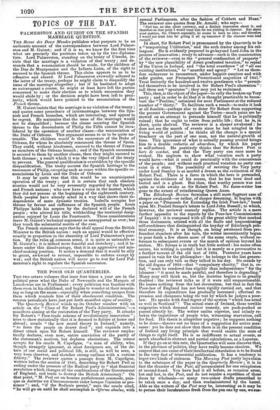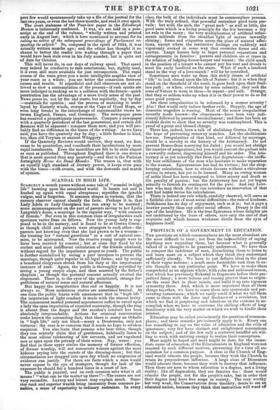THE POOR OLD QUARTERLIES.
THE two octavo volumes that issue four times a year are in the political press what the Duke of Newcastle and the Marquis of Lansdowne are in Parliament : every politician was familiar with them even in his childhood, and begins to wonder at their remain- ing so long on the scene—especially when something escapes from them which reminds him of their obsolescent condition. The Veteran periodicals have just put forth manifest signs of senility. The Quarterly Review winds up its October number with an article on the " Close of Sir Robert Peel's Administration,"—a manifesto aiming at the restoration of the Tory party. It attacks Sir Robert's "Free-trade scheme of revolutionary innovation " ; tries to show statistically that it is doomed to failure at home and abroad ; assails " the new moral theory in Ireland," namely, "to force the people on dearer food 7; and expands into a direct attack upon Sir Robert himself. The reviewer empha- tically declares, even now, entire conviction of the purity of the statesman's motives, but deplores aberrations. The censor accepts for his oracle M. Capefigue, "a man of ability, who, though strangely ignorant, as most foreigners are, of the de- tails of our social and political life, is still, as will be seen, a very keen observer, and sketches strong outlines with a curious felicity." The reviewer quotes a passage from M. Capefigue, written before the session of 1845, describing Sir Robert Peel as ceding under the pressure of the Radical party to " that financial revolution which changes all the combinations of the Government of England, and tends to destroy the British Aristocracy." On that point, ".M. Peel eat un homme parfaitement commode, puis- que an doctrine eat d'incessamment ceder lorsque l'opinion se pro- nonce": and, "if the Radicals persist," says the oracle cited, "he will go on until he shall accomplish /a reforms absolue, with annual Parliaments, after the fashion of Cobbett and Hunt." The reviewer also quotes from Dr. Arnold; who says— "Peal has an idea about currency-, and a distinct impression about it; and therefore on that point I would trust him for not yielding to clamour. But about most matters, the Church especially, he seems to have im idea; and therefore I Would not trust him for giving it all up tomorrow if the clamour were loud enough."
In short, Sir Robert Peel is pronounced by the Quarterly to be a "temporizing Utilitarian," and the arch traitor among his col- leagues. He is evidently prepared to go beyond Lord John in the process of innovation ; ready to advance—such is the construction of the reviewer—even to the "general confiscation of property" by "the new plausibility of direct graduated taxation," to repeal of the Union in Ireland, and "the total overthrow" of "all our existing institutions," to "anarchy and agony." - "Let us there- fore endeavour to reconstrtict, under happier auspices and with safer guides, our Protestant Protectionist majorities of 1841." Treat leniently the hundred-and-twelve gentlemen who "permit- ted themselves to be involved in Sir Robert Peel's aberration" : call them not " apostates " ,• they may yet be reclaimed.
This, then, is the object of the paper—to rally the broken-up Tory party and in order to do:that it is thought practicable to recon- vert & " Peelites," estimated for next Parliament at the reduced number of" thirty." To facilitate such a result—to make it look at all feasible—perhaps also to deter Sir Robert from supporting the present Government against the Tories—much pains are be- stowed on an attempt to persuade himself that he is politically ruined ; that he ought to retire from public life ; that he is, in short, quite shelved. The reviewer is a sleeper awakened : he does not see the march of events since he last mingled in the living world of politics : he thinks all the change is a special treachery on the part of one man, not the natural growth of time. This ignorance of what is actually passing around brings him to a double reductio ad absurdum, by which his paper is self-refuted. He positively thinks that Sir Robert Peel is hors de combat, and that the Tory party can once more be evoked. He neglects to show what vocation such a party would have—what it could do practically with the concurrence of the people ; and without such practical vocation no party can ' exist in a state. The possibility of reviving the Tory party under Lord Stanley is as morbid a dream as the extinction of Sir Robert Peel. There is a farce in which the hero is persuaded, against the evidence of his senses, that he has been dead and buried and is a ghost. But then, that worthy person was not quite BO wide awake as Sir Robert Peel. No farce-writer has gone to the extent of reenthroning Queen Anne. The Edinburgh Review furnishes a still more flagrant case of sleeper awakened—or rather, of sleeper dreaming. It begins with a paper on "Proposals for Extending the Irish Poor-law," based upon Mr. Poulett Scrope's letters to Lord John Russell; to which, however, the reviewer scarcely replies. The article is a mere further appendix to the reports by the Poor-law Commissioners of Inquiry : it is composed with all the great ability that marked. those documents, uttered with all the facile and unquestioninfy self-confidence that distinguished the heyday of Edinburgh poli- tical economy. It is as though, on being awakened from pro-. foundest slumbers after his toils, the writer incontinently began to pour forth a few sheets more of the same staple, without re- ference to subsequent events or the march of opinion beyond his station. Mr. Scrope is in truth but little noticed : his name often occurs his writing is quoted ; but it is merely as a provocative to a further torrent of the old text of 1834. Posterior years have passed in vain for the philosopher : he belongs to the last genera- tion, and can only talk as they talked in his day. He stands by the old dogma of 1834—that "compulsory charity," that is, re- lief, "must be rendered less eligible than independence" for the labourer : "it must be made painful, and therefore is degrading." Many may still think so, but the doctrine begins to be greatly doubted : the reviewer talks as if it were still unquestionable. He learns nothing from the last decennium, but that in fact the Poor-law of England has not been rigidly carried out, and that therefore its expenditure has gradually increased ; effectual re- pression and cheapness being the test by which he judges a poor- law. He speaks with fond regret of the system "which has acted so well in Scotland" I The actual state of Ireland, those terrible exigencies which demand instant remedy, are pooh-poohed or passed silently by. The writer smiles superior, and calmly re- bakes the impatience of people who, witnessing starvation, call for food. His thesis is altogether negative ; he suggests nothing to be done—throws out no trace of a suggestion for active mea- sures: yet he does not show that there is in the present condition of Ireland any living principle that would enable the state of things to right itself. He is as indifferent to actual events, as much absorbed in abstract and partial calculations, as a Laputan. If they go on at this rate, the Quarterlies will soon discover that, in the province of politics, they have really become obsolete. We suspect that one cause of their intellectual retardation is to be found in the very fact of trimestrial publication. It has a tendency to beget two kinds of staleness. The Morning Post justly lays claim to the substance of the paper in the Quarterly Review ; it is in fact the thunder of the Post, all'accumulated for one rcexplosion at *second-hand. You have had it all before, as occasion arose, hot and hot, in the Post, and do not require a repetition of these doses by wholesale—so many two-ounce drafts prescribed to be taken once a day, and then readministered by the barrel. Able as the writers of the Post may be, interesting as it may be to peruse their lucubrations fresh from the pen one by one, we sus-
pect few would spontaneously take up a file of the journal for the last two years, or even the last three months, and read it over again.
The overt staleness of the Poer-law paper in the' Edinburgh Review is ludicrously confessed. It was, we are told in a post- script at the end of the volume, "wholly written and printed early in August last ; which is here mentioned to account for its taking no notice of the subsequent proceedings of Parliament re- specting. its subject." So, composed in the spirit of 1834, it was actually written months ago ; and the editor has thought it no shame to betray the reader into wading through a paper that would have been stale even in his July number, but is quite out of date for October.
. This will never do, in our days of railway speed. That speed may indeed be conducive to rash conclusions, -but, rightly used, it is even still more available for just retrospection. The rapid course of the train gives you a more intelligible matilike view of your route as a whole; you see better the connexion between causes and results. If superficial and dull observers are not al- lowed so slow a contemplation of the present—if rash spirits are more indulged in rushing on to a collision with the future—quick penetration has the advantage of a more lively sense of the past. News pours in, not by fits and starts, but regularly, day by day —materials for opinion ; and the process of maturing is unde- layed by Easterly winds, storms at the Cape of Good Hope, or even long- breaks in the interchange of statesmanlike views be- tween England, France, and. Germany. The newspaper press has received a proportionate improvement. Compare a newspaper with a quarterly periodical of the last generation, and certain dif- ferences will be apparent : compare them now, and you will pro- bably find no difference in the tissue of the writing. As we have said, you have the quarterly day by day ; a little fresher in kind, too, than old Toryism or ancient Whiggery.
If the Quarterly Reviews would survive, they must, we fear, cease to be quarterlies, and vouchsafe their lucubrations by more rapid instalments. Even the monthlies are felt to be stale almost as soon as published. Throughout England there is one review that is more quoted than any quarterly—and that is the Parisian fortnightly Revue des Dean Mantles. The reason is, that with an equally high standard of literary power, it keeps even pace with the times—with events, and with the demands and march of opinion.



























 Previous page
Previous page